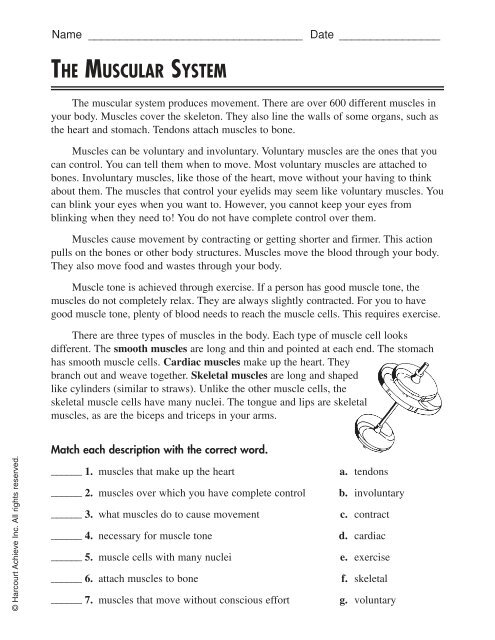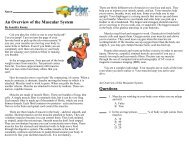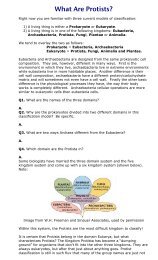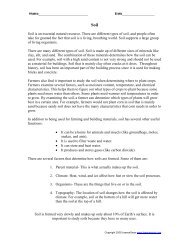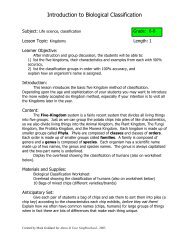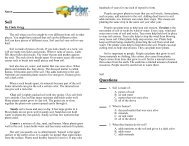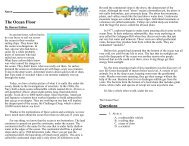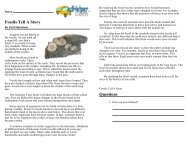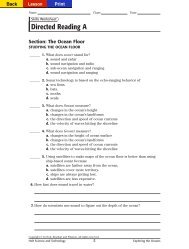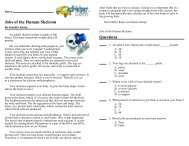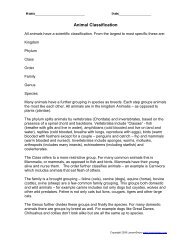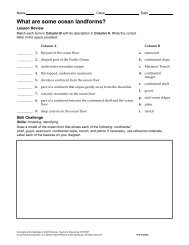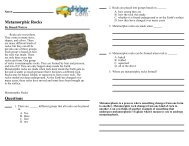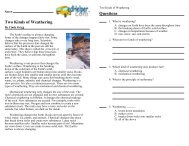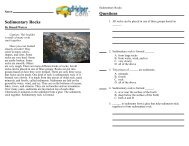THE MUSCULAR SYSTEM
THE MUSCULAR SYSTEM
THE MUSCULAR SYSTEM
Create successful ePaper yourself
Turn your PDF publications into a flip-book with our unique Google optimized e-Paper software.
Name __________________________________<br />
Date ________________<br />
<strong>THE</strong> <strong>MUSCULAR</strong> <strong>SYSTEM</strong><br />
The muscular system produces movement. There are over 600 different muscles in<br />
your body. Muscles cover the skeleton. They also line the walls of some organs, such as<br />
the heart and stomach. Tendons attach muscles to bone.<br />
Muscles can be voluntary and involuntary. Voluntary muscles are the ones that you<br />
can control. You can tell them when to move. Most voluntary muscles are attached to<br />
bones. Involuntary muscles, like those of the heart, move without your having to think<br />
about them. The muscles that control your eyelids may seem like voluntary muscles. You<br />
can blink your eyes when you want to. However, you cannot keep your eyes from<br />
blinking when they need to! You do not have complete control over them.<br />
Muscles cause movement by contracting or getting shorter and firmer. This action<br />
pulls on the bones or other body structures. Muscles move the blood through your body.<br />
They also move food and wastes through your body.<br />
Muscle tone is achieved through exercise. If a person has good muscle tone, the<br />
muscles do not completely relax. They are always slightly contracted. For you to have<br />
good muscle tone, plenty of blood needs to reach the muscle cells. This requires exercise.<br />
There are three types of muscles in the body. Each type of muscle cell looks<br />
different. The smooth muscles are long and thin and pointed at each end. The stomach<br />
has smooth muscle cells. Cardiac muscles make up the heart. They<br />
branch out and weave together. Skeletal muscles are long and shaped<br />
like cylinders (similar to straws). Unlike the other muscle cells, the<br />
skeletal muscle cells have many nuclei. The tongue and lips are skeletal<br />
muscles, as are the biceps and triceps in your arms.<br />
©Harcourt Achieve Inc. All rights reserved.<br />
Match each description with the correct word.<br />
______ 1. muscles that make up the heart<br />
______ 2. muscles over which you have complete control<br />
______ 3. what muscles do to cause movement<br />
______ 4. necessary for muscle tone<br />
______ 5. muscle cells with many nuclei<br />
______ 6. attach muscles to bone<br />
______ 7. muscles that move without conscious effort<br />
a. tendons<br />
b. involuntary<br />
c. contract<br />
d. cardiac<br />
e. exercise<br />
f. skeletal<br />
g. voluntary
The Muscular System<br />
Answer Key<br />
1. d<br />
2. g<br />
3. c<br />
4. e<br />
5. f<br />
6. a<br />
7. b<br />
©Harcourt Achieve Inc. All rights reserved.<br />
Meet your state standards with free blackline<br />
masters and links to other materials at<br />
www.HarcourtAchieve.com/AchievementZone.<br />
Click Steck-Vaughn Standards.


